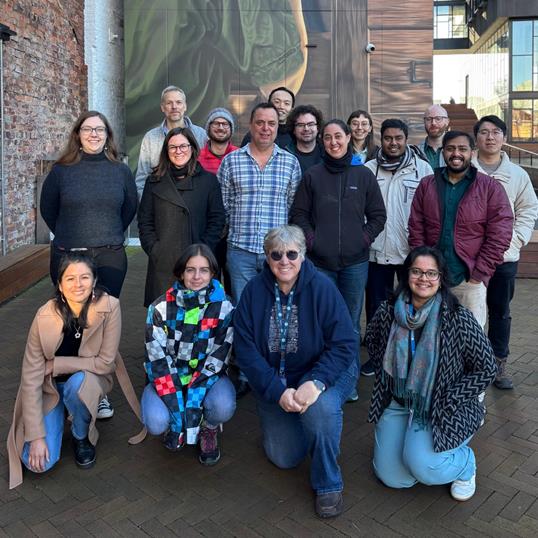Advancing Regional Marine Ecosystem Modelling: From Southern Ocean to Global Perspectives

In June 2025, a group of 20+ scientists from all over the world gathered in chilly Hobart, Tasmania and online to address a critical challenge- How do we tackle uncertainties in climate change models to provide meaningful advice for policymakers and other stakeholders?. This four-day workshop “Advancing Regional Marine Ecosystem Modelling: From Southern Ocean to Global Perspectives” brought together researchers at various career stages.
Hosted by the Institute for Marine and Antarctic Studies (IMAS), University of Tasmania and co-funded by Australian Centre for Excellence in Antarctic Science (ACEAS), the Australian Antarctic Program Partnership (AAPP), and The Fisheries and Marine Ecosystem Model Intercomparison Project (FishMIP), the workshop discussions were collaborative, forward-looking and highlighted the urgency and complexity of modelling marine ecosystems in a changing climate.
A central theme was the challenge of uncertainties in ecosystem models with a specific focus on southern ocean regional models as it is data-deficient. While FishMIP 2.0 has made significant advancements in standardising inputs and outputs and incorporating fishing impacts, regional models still face difficulties in downscaling global climate data and capturing fine-scale ecological processes. This is partly due to the diversity of regional models, each built for different purposes under varying assumptions.
Presentations from Dr Kelly Ortega-Cisneros (FishMIP regional modelling lead) and Kieran Murphy (IMAS, workshop lead coordinator) highlighted ongoing efforts to develop standardised workflows and protocols, such as the Southern Ocean Marine Ecosystem Model Ensemble (SOMEME), to improve consistency and reduce variability across models.
The group also discussed the limitations of current Earth system models, the need for “ensemble approaches” and the importance of linking regional and global models to better inform fisheries management and ecosystem conservation strategies.
A highlight of the workshop was the hands-on session on AI-assisted ecosystem modelling, led by Dr Scott Spillias (CSIRO) and Dr Kieran Murphy. The participants explored how large language models (LLMs) and coding agents like Roo and Github Copilot can be used to assist model development, calibration and code translation. Activities included generating diet matrices, converting codes from one language to another and visualizing model outputs.
While the potential of AI was clear, participants also acknowledged its limitations, emphasising the need for human oversight and careful validation of AI-generated models.
Prof Julia Blanchard (FishMIP lead) introduced the Ocean System Pathways (OSPs) framework to align ecosystem modelling with socioeconomic scenarios. The OSP framework narratives range from sustainability-first to high-tech market driven futures and aims to contextualise shared socioeconomic pathways (SSPs) within fisheries and ocean governance. Translating these storylines into quantitative model inputs is a key goal for the next phase of FishMIP. This integration of human dimensions ensures that the future FishMIP projections are not only scientifically robust but also socially relevant.
The workshop closed with reflections from participants across career stages. Many appreciated the diversity of expertise, collaborative atmosphere and the opportunity to engage with new ideas and tools.
As climate change continues to reshape our oceans, the FishMIP community remains committed to advancing science that informs sustainable and resilient marine futures.